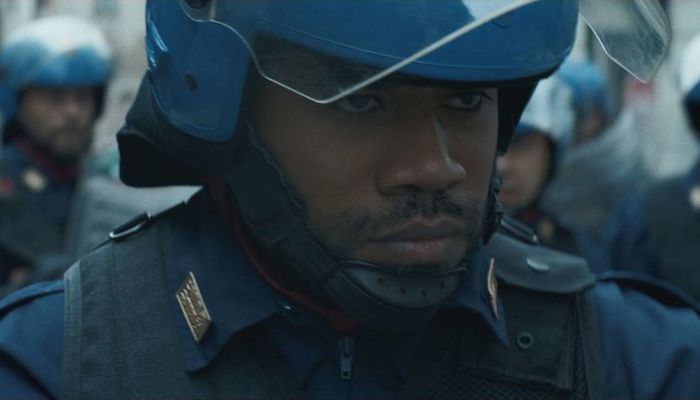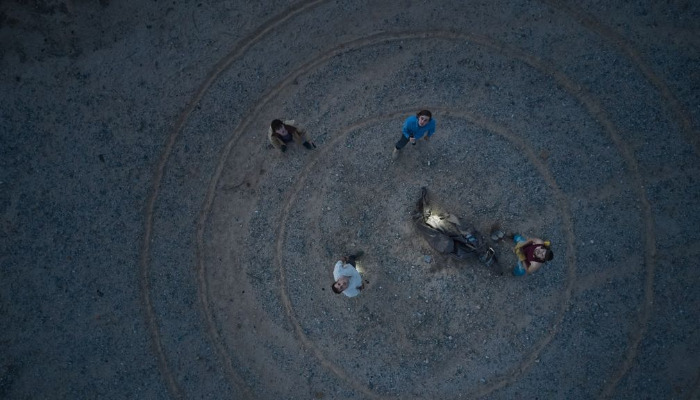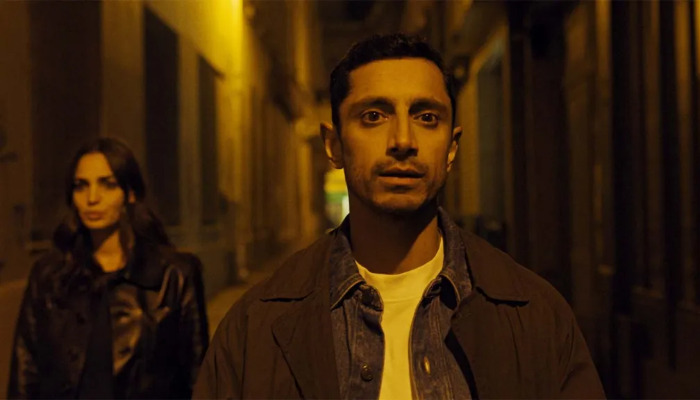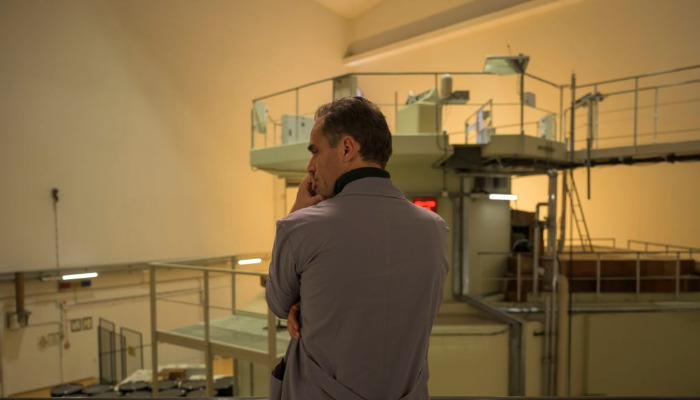Film Review: IL LEGIONARIO: A Thorny Moral Drama at the Crossroads of Conviction and Complacency [Locarno 2021]
Il Legionario Review
Il Legionario (2021) Film Review from the 74th Annual Locarno Film Festival, a movie directed by Hleb Papou, starring Germano Gentile, Maurizio Bousso, Marco Falaguasta, Ilir Jacellari, and Antonio Veneziano.
Adapted from Papou’s 2017 short film of the same name (which also featured Germano Gentile in the lead role), Il Legionario (Italian for “The Legionnaire”) follows Daniel, the only African-Italian man on the riot team of Rome’s police department. An immigrant from Cameroon, Daniel joined the police department years ago as an inside man for his family’s housing complex. The complex, a place where his mother and his brother Patrick (Maurizio Bousso) continue to live, exists within a legal gray area: an otherwise abandoned building maintained by more than 200 undocumented immigrants or low-income individuals in a commune-like set-up.
He may not voice it directly, but it’s evident that Daniel hopes to reform Rome’s police from the inside out – or, at least, he had hoped to do so before he got complacent with his comfy social status. But in all fairness to Daniel he is good at his job – which in this instance is to say he can withstand protestors’ resistance without so much as flinching, clad in blue riot gear and a helmet sarcastically adorned with a yellow smiley face sticker.
Over time, though, the racist taunts that the white officers playfully direct towards him start to grate on his nerves, and he fears that the department is moving too close to evicting his family’s whole housing complex. Daniel does not want to go against either his family or his team leader Aquila (Marco Falaguasta), but with a child on the way he’s also unwilling to give up his cushy job. Placed at a moral crossroads, Daniel must contend with the thorny reality of his predicament before everyone he cares about is figuratively and literally left for dead.
It feels a bit patronizing for me, a white American, to speak on policing culture in any other country when my country’s own policing culture – one that’s deeply entrenched with militaristic violence, racism, and genocide the world over – is currently being scrutinized under the microscope of the zeitgeist. (Something about glass houses and stones …) However, if we are committed to the progressive ideal of abolition as something we should all be moving towards, then of course All Cops Are Bastards and anything short of that mentality is still copaganda (entertaining at times, but still copaganda nonetheless), and unfortunately Il Legionario falls short of committing to that wholehearted systemic condemnation.
However, that’s not to say that Papou doesn’t offer any apt critiques of policing. On the contrary, Il Legionario frames Rome’s police as but another arm of insidious bureaucracy wholly indebted to capital, specifically one that relies on xenophobia and fear in order to operate. This is demonstrated by Aquila feigning familial sensibilities with Daniel to ease the latter’s growing concerns, only to turn around and fraternize with right-wing extremists; however, it’s also demonstrated in how the public official working with Patrick and the housing complex leaders willingly accepts the city government’s refusal to grant the tenants full citizenship and tenancy of the building, easily succumbing to defeat.
Whether it’s the cognitive dissonance of harboring racist beliefs or timidly giving in to the gentrifying landlords who hold sway at city hall, Papou shines a light on the true allegiance of public officials within Western democracies. His film may not advocate a truly revolutionary view (the jokey write-offs of the “half-communists” within the municipality and the handful of depictions of unruly tenants ensure that tone), but he’s not afraid to point out the glaring flaws within the system at-large. Maybe it’s too reductive of a comparison but think of it as Italy’s response to BlacKkKlansman.
What’s even more impressive is how Papou interweaves all of these observations in such a robust manner – all within the span of 80-odd minutes, no less. Along with his co-writers Giuseppe Brigante and Emanuele Mochi, he balances out the narrative between Daniel, Patrick, and even Aquila to reveal their similar struggles – their family lives, their personal politics, and where they fit within Rome’s local government – and how they differently affect every decision they make.
Daniel is the most compelling character study of the three, and Gentile portrays him with a tactful restraint. He sardonically elides his dedication to the force with “Fuck the Police” t-shirts and GTA-like cop-shooting videogames on his days off but that doesn’t conceal his remaining pride in his work (further revealed by his sustained sense of apathy toward the poor). Conversely, his tough and bulky demeanor is undercut by his expressive eyes that show anger when he snaps at a right-wing nationalist, or fear as his team prepares to invade his family’s housing complex. Despite becoming more attuned to his own moral compass and all its contradictions, the tragedy is that Daniel has come to realize the futility of his original mission; in the end, he became the exact opposite of what he set out to be, potentially made things worse in doing so, and threw his life’s progress into a static state.
Regardless of its occasionally lax framing, Il Legionario is still a prickly condemnation of police brutality, bureaucratic malfeasance, and the cognitive dissonance maintained by those who partake in such systems. It’ll get your blood boiling, for one reason or another.
Rating: 7/10
Leave your thoughts on this Il Legionario review and the film below in the comments section. Readers seeking to support this type of content can visit our Patreon Page and become one of FilmBook’s patrons. Readers seeking more Fantasia International Film Festival news can visit our Locarno Film Festival Page, our Film Festival Page, and our Film Festival Facebook Page. Readers seeking more film reviews can visit our Movie Review Page, our Movie Review Twitter Page, and our Movie Review Facebook Page. Want up-to-the-minute notifications? FilmBook staff members publish articles by Email, Twitter, Facebook, Instagram, Tumblr, Pinterest, Reddit, and Flipboard.
Related Articles
FilmBook's Newsletter
Subscribe to FilmBook’s Daily Newsletter for the latest news!













